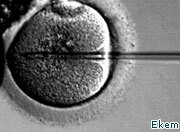US scientists have, for the first time, recovered stem cells from cloned human embryos, in a move raising serious ethical concerns.
Critics warn that the technique, which is similar to the one used to clone Dolly the sheep, could pave the way for ‘designer’ babies being cloned in laboratories.
But the team from Oregon Health and Science University, led by Dr Shoukhrat Mitalipov, dismissed the concerns.
Irresponsible
Dr David King, founder of Human Genetics Alert, called for an international ban on human cloning.
He said it was “irresponsible in the extreme” to have published details of the study.
Josephine Quintavalle, from the group Comment on Reproductive Ethics, questioned the need for the research when more simple ways of making customised stem cells already exist.
Cloners
She said: “The suspicion has to be that the real interest is not stem cell therapy per se, given that other uncontroversial approaches are already so successful. Let’s hope that the goal is not out and out reproductive cloning.”
Dr King warned: “Scientists have finally delivered the baby that would-be human cloners have been waiting for: a method for reliably creating cloned human embryos.
“This makes it imperative that we create an international ban on human cloning before any more research like this takes place.
“It is irresponsible in the extreme to have published this research.”
The study was published in the journal Cell.
Dehumanise
In March the Human Fertilisation and Embryology Authority in the UK advised the Government to allow the creation of three-parent embryos, amid concerns about future genetically modified children.
Supporters claimed the technique, which would create babies with two genetic mothers and one genetic father, could eliminate mitochondrial disease, a genetic condition passed from mother to child.
But leading scientists and ethicists have warned about the potential to dehumanise and commodify relationships between children and parents.

